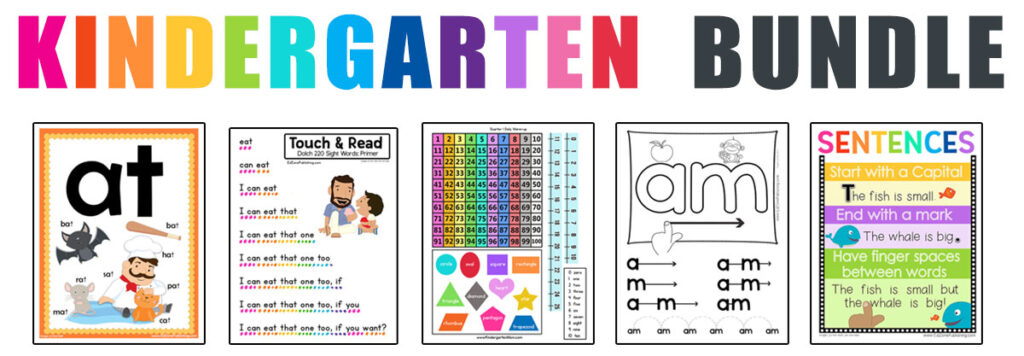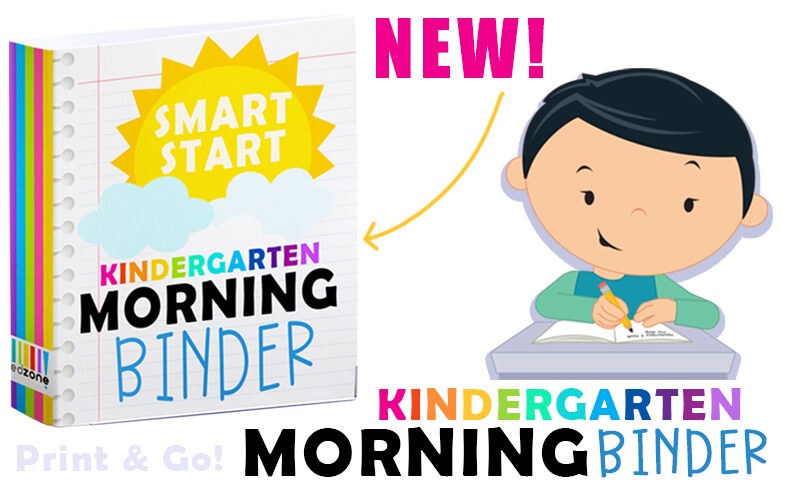Teaching Kindergarten at home is a great start to homeschooling. It’s easier to start homeschooling from the beginning than to transition from public or private school later down the road. So if you’re here because you are looking for ways to begin on the right foot during your child’s first year of school, then these 10 Quick Tips for a Smooth Year will be an encouragement for you!
Kindergarten at Home: 10 Quick Tips for a Smooth Year
Here are 10 ways that you can ensure the first year of homeschool kindergarten is enjoyable for both you and your child. Remember these things, and although you will almost certainly encounter some bumps in the road, you’ll be able to stay on the ride!
1. Pace Yourself
Many beginning homeschool moms try to plan too many tasks into one day. Try to think about how much time each task will take you with your child, and make a schedule that is do-able.
- Meaningful Assignments – Don’t assign tasks that are just “busy work” – make sure that the assignments or tasks you wish to complete with your child are worthy of the time spent on them.
- Set Goals and a Plan to Meet Them – Consider the goals you have in mind that you want your child to meet by the end of the homeschool year – and split those goals into monthly, weekly, and then daily tasks that you and your child can reasonably manage.
- Be Purposeful – Remember that you are in control of how you pace your child’s learning, and you don’t have to do more than necessary, and you can also work at your own child’s pace.
2. Don’t Compare Your Homeschool to Anyone Else’s
There are no perfect homeschooling methods or curricula, and what works for your own family will probably be very different from other home educating families you know. Here are ways to avoid the comparison trap:
- Remember Your Purpose – Your reason for homeschooling is probably not the same as your friend’s. Remember that our purpose drives our decisions in regards to what curriculum we choose to follow, how we plan our days, the standards we set for ourselves, and how we interact with our homeschooled children.
- You Don’t Have to Apply Every Bit of Advice You Receive – Focus on why you chose to homeschool in the first place, and take your friend’s advice with a grain of salt. Her advice may be helpful or harmful to your own plans and purpose.
- There are MANY “Right” Ways to Homeschool! – There is no one perfect way to homescho , because every family is different. What works for one family, may not work for the next!
3. Make Learning Fun
Whatever things your own child enjoys or finds interesting, find ways to incorporate those things into his/her learning. By doing so, the days will be more enjoyable for both of you!
- Methods – Some children LOVE workbooks, others enjoy hands-on experiences, others enjoy active games. Videos are engaging for some children, while others prefer discussion. The first year of homeschooling is a great time to try out lots of different methods for teaching or practicing concepts, and figure out which are your child’s favorites. Then, add them to your regular plans, and see a love for learning develop in your child.
- Interests – If your child is fascinated with Science, try to blend Science into other subjects whenever possible, such as a Science experiment on how plants grow that is linked to a Math measurement unit (your child can measure the growth of the plant, for instance). If it’s Art, add an arts or crafts project linked to the Reading assignment for the day.
- Learning Style – Each child has their own unique style of learning – some are book lovers, some are auditory, some are active learners, and some need peace and quiet. Meet your child’s particular needs so they can be the most successful in meeting your goals for them.
4. Have Realistic Expectations
Whatever you’ve read on blogs or your friends’ social media profiles, or seen on television, don’t assume it is going to look like that in your own household. Your family will work things out on your own, and homeschooling will look just the way it’s supposed to for your own needs.
- It’s Not All Fun and Games – Homeschooling may be depicted as enjoyable, engaging, and fun when you look at it from the outside, but the truth is that there will be times when it gets hard. There will be struggles and doubts, just as there are struggles and doubts with families who choose public or private school (homework struggles and morning rush drama, anyone?). If you are responsible in your homeschooling, you will want the best education for your child, and you will assuredly have some moments when you and your child will simply have to buckle down and get the work done, tears and all.
- You WILL Bond – Being together all day long, working on challenging tasks together, and functioning as a team is what a daily homeschool family experiences. There will be many times that ARE enjoyable and memorable, and the relationships between you and your children, and between your children and their siblings will grow and flourish as time passes. This is one of the things that most homeschooling families say is the biggest reward to homeschooling, and why over time, it’s so worth it.
- You Might Not Be Able to Do It All – Homeschooling, especially during the first few years, can be very demanding and difficult to balance with your other tasks, especially if you work a job, have multiple children, or have other responsibilities in your home or community. It’s important that you realize that you may need to cut back on some things, and pick and choose where you invest your time. Balancing homeschooling with other responsibilities is not easy, but it can be done if you realize that you may have to let some other things go that aren’t as important to you.
5. Diversify Learning
It would be highly unusual for one specific curriculum or method of teaching to meet your child’s needs perfectly. In the first year especially, try to diversify the choices you make in curriculum and planning.
- Curriculum – Try a variety of curricula. You might choose video learning for one subject, workbooks and textbooks for another, and a co-op experience for another. See what works! Then, be willing to change things up mid-year if necessary, if something doesn’t work out.
- Experiences – Field trips, Science experiments, arts and crafts, and technology are all ways you can provide learning opportunities for your children. Don’t assume that every day has to look the same. By incorporating these things occasionally or even regularly, your homeschool days will be more fresh and exciting.
6. Get Connected
Reach out to your local homeschool groups for support and fellowship! You don’t have to embark on this journey alone, there are many homeschool groups online, or within your community to join. Connecting NOW, before you feel like you NEED the support will make it easier to reach out later when you could use assistance, or a pat on the back.
7. Enlist Extended Family Members
Homeschooling is a group effort!! If you have family members that can help teach a subject, or take your child on a field trip (think bring your grandkid to work day) take advantage of the extra help!
8. Study Your World
Along the same lines as enlisting family members for help, look for real-world opportunities to teach your child. This requires a bit of flexibility which is definitely one benefit to homeschooling. For example, if your cat brings home a lizard, take the time to research all about that lizard (name, habitat, diet ect….) These impromptu, discovery-led explorations seem to stick with children much longer than scheduled seatwork.
9. Review, Review, Review
While it might be tempting to PLOW full steam ahead through your scheduled lessons, be sure you have scheduled time for review and reflection. It’s always good to cycle back to previously taught lessons to ensure that children are in fact understanding and remembering what they learned.
10. Keep a Small Portfolio
Even if your state doesn’t require a portfolio, record keeping can be beneficial for your own planning. Not only will you be able to easily see which subjects you’ve previously taught, but hanging on to work examples can be a major encouragment for your child. Being able to see how far they’ve come and what skills they’ve developed is very encouraging for young learners.





Comment (1)
Thanks for the tips, very helpful.